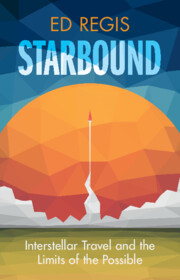Book contents
- Starbound
- Starbound
- Copyright page
- Dedication
- Contents
- Preface
- 1 Origins of the Dream
- 2 The 100 Year Starship
- 3 Three Icons of Star Travel
- 4 Project Orion
- 5 Where To?
- 6 The World Ship
- 7 Hail Mary Propulsion Systems, Inc.
- 8 The Fate of the Crew
- 9 The Moral Status of the Trip
- 10 Let Us Hibernate
- 11 Why Go?
- 12 The Odds
- Bibliography
- Index
- Starbound
- Starbound
- Copyright page
- Dedication
- Contents
- Preface
- 1 Origins of the Dream
- 2 The 100 Year Starship
- 3 Three Icons of Star Travel
- 4 Project Orion
- 5 Where To?
- 6 The World Ship
- 7 Hail Mary Propulsion Systems, Inc.
- 8 The Fate of the Crew
- 9 The Moral Status of the Trip
- 10 Let Us Hibernate
- 11 Why Go?
- 12 The Odds
- Bibliography
- Index
Summary
Researchers proposed ever larger and yet more implausible designs for interstellar vehicles. And so in 1996, writing in the journal Nanotechnology, one Thomas L. McKendree discussed what would be possible if materials provided by molecular nanotechnology were used to build spacecraft in place of then current structural building materials such as aluminum, steel, and titanium. Molecular nanotechnology was the theoretical ability to design and build products to atomic precision. Such a technology, which does not exist as yet and might never, would allow the use of diamondoid materials that had much higher strength-to-density ratios than those that are now used to build structures. In his paper “Implications of Molecular Nanotechnology Technical Performance Parameters on Previously Defined Space System Architectures,” McKendree argued that the use of diamondoid structural materials would make possible extremely large space colonies. The classic cylindrical colony, for example, if made of diamondoid structural elements could have a radius of 461 kilometers and a length of 4,610 kilometers, or 2,865 miles.
- Type
- Chapter
- Information
- StarboundInterstellar Travel and the Limits of the Possible, pp. 96 - 118Publisher: Cambridge University PressPrint publication year: 2025

